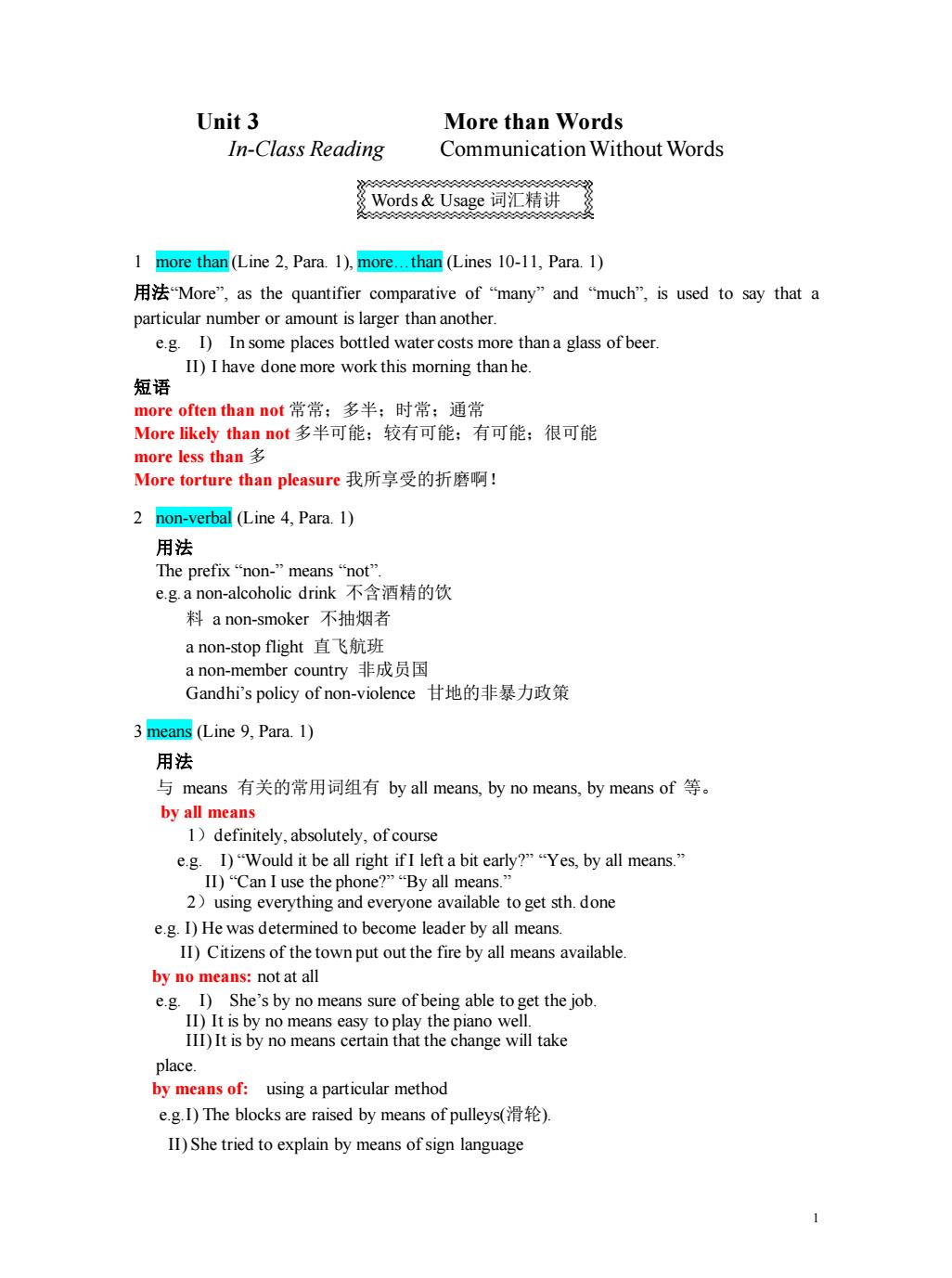
Unit 3 More than Words In-Class Reading Communication Without Words Words&Usage词汇精讲 1 more than (Line 2,Para.1),more...than (Lines 10-11,Para.1) 用法More”,as the quantifier comparative of“many”and "much',is used to say that a particular number or amount is larger than another. e.g.I)In some places bottled water costs more than a glass of beer II)I have done more work this morning than he. 短语 more often than not常常;多半;时常;通常 More likely than not多半可能;较有可能;有可能:很可能 more less than多 More torture than pleasure我所享受的折磨啊! 2 non-verbal (Line 4,Para.1) 用法 The prefix“non-”means“not" e.g.anon-alcoholic drink不含酒精的饮 料anon-smoker不抽烟者 anon-stop flight直飞航班 anon-member country非成员国 Gandhi's policy of non-violence甘地的非暴力政策 3 means (Line 9,Para.1) 用法 与means有关的常用词组有by all means,by no means,by means of等。 by all means 1)definitely,absolutely,of course e.g.I)"Would it be all right if I left a bit early?""Yes,by all means." II)"Can I use the phone?""By all means." 2)using everything and everyone available to get sth.done e.g.I)He was determined to become leader by all means. II)Citizens of the town put out the fire by all means available. by no means:not at all e.g.I)She's by no means sure of being able to get the job. II)It is by no means easy to play the piano well. III)It is by no means certain that the change will take place by means of:using a particular method e.g.I)The blocks are raised by means of pulleys() II)She tried to explain by means of sign language 1
1 Unit 3 More than Words In-Class Reading Communication Without Words Words & Usage 词汇精讲 1 more than (Line 2, Para. 1), more…than (Lines 10-11, Para. 1) 用法“More”, as the quantifier comparative of “many” and “much”, is used to say that a particular number or amount is larger than another. e.g. I) In some places bottled water costs more than a glass of beer. II) I have done more work this morning than he. 短语 more often than not 常常;多半;时常;通常 More likely than not 多半可能;较有可能;有可能;很可能 more less than 多 More torture than pleasure 我所享受的折磨啊! 2 non-verbal (Line 4, Para. 1) 用法 The prefix “non-” means “not”. e.g. a non-alcoholic drink 不含酒精的饮 料 a non-smoker 不抽烟者 a non-stop flight 直飞航班 a non-member country 非成员国 Gandhi’s policy of non-violence 甘地的非暴力政策 3 means (Line 9, Para. 1) 用法 与 means 有关的常用词组有 by all means, by no means, by means of 等。 by all means 1)definitely, absolutely, of course e.g. I) “Would it be all right if I left a bit early?” “Yes, by all means.” II) “Can I use the phone?” “By all means.” 2)using everything and everyone available to get sth. done e.g. I) He was determined to become leader by all means. II) Citizens of the town put out the fire by all means available. by no means: not at all e.g. I) She’s by no means sure of being able to get the job. II) It is by no means easy to play the piano well. III) It is by no means certain that the change will take place. by means of: using a particular method e.g.I) The blocks are raised by means of pulleys(滑轮). II) She tried to explain by means of sign language
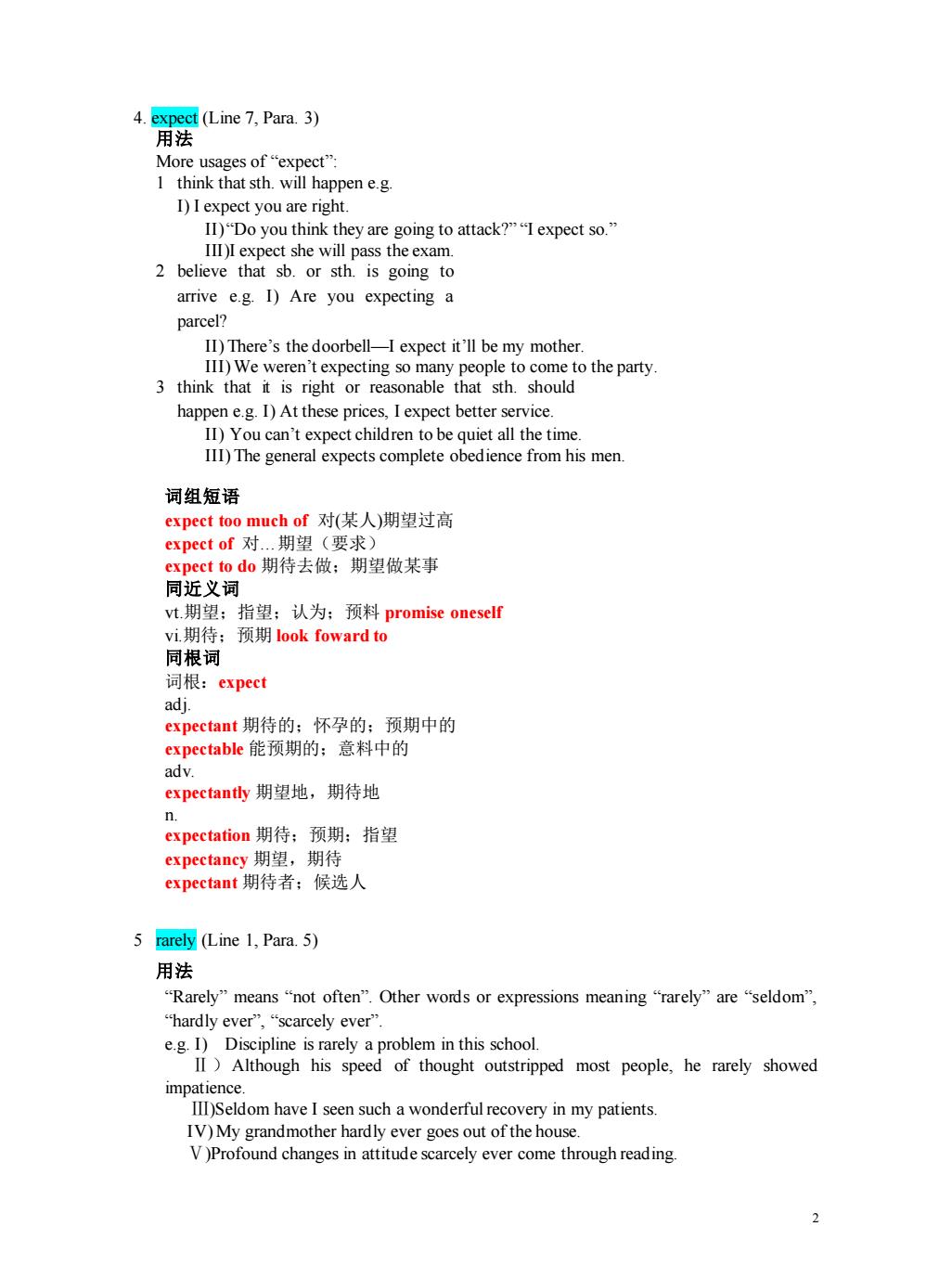
4.expect (Line 7,Para.3) 用法 More usages of"expect": 1 think that sth.will happen e.g. I)I expect you are right. II)"Do you think they are going to attack?""I expect so." III)I expect she will pass the exam. 2 believe that sb.or sth.is going to arrive e.g.I)Are you expecting a parcel? II)There's the doorbell-I expect it'll be my mother III)We weren't expecting so many people to come to the party. 3 think that it is right or reasonable that sth.should happen e.g.I)At these prices,I expect better service II)You can't expect children to be quiet all the time III)The general expects complete obedience from his men. 词组短语 expect too much of对(某人)期望过高 expect of对..期望(要求) expect to do期待去做;期望做某事 同近义词 vt.期望;指望;认为;预料promise oneself vi期待;预期look foward to 同根词 词根:expect adj. expectant期待的;怀孕的;预期中的 expectable能预期的;意料中的 adv. expectantly期望地,期待地 久 expectation期待:预期;指望 expectancy期望,期待 expectant期待者;候选人 5 rarely (Line 1,Para.5) 用法 Rarely'means“not often”.Other words or expressions meaning“rarely”are“seldom”, hardly ever'”,“scarcely ever. e.g.I)Discipline is rarely a problem in this school II )Although his speed of thought outstripped most people,he rarely showed impatience. III)Seldom have I seen such a wonderful recovery in my patients IV)My grandmother hardly ever goes out of the house. V)Profound changes in attitude scarcely ever come through reading. 2
2 4. expect (Line 7, Para. 3) 用法 More usages of “expect”: 1 think that sth. will happen e.g. I) I expect you are right. II)“Do you think they are going to attack?” “I expect so.” III)I expect she will pass the exam. 2 believe that sb. or sth. is going to arrive e.g. I) Are you expecting a parcel? II) There’s the doorbell—I expect it’ll be my mother. III) We weren’t expecting so many people to come to the party. 3 think that it is right or reasonable that sth. should happen e.g. I) At these prices, I expect better service. II) You can’t expect children to be quiet all the time. III) The general expects complete obedience from his men. 词组短语 expect too much of 对(某人)期望过高 expect of 对…期望(要求) expect to do 期待去做;期望做某事 同近义词 vt.期望;指望;认为;预料 promise oneself vi.期待;预期 look foward to 同根词 词根:expect adj. expectant 期待的;怀孕的;预期中的 expectable 能预期的;意料中的 adv. expectantly 期望地,期待地 n. expectation 期待;预期;指望 expectancy 期望,期待 expectant 期待者;候选人 5 rarely (Line 1, Para. 5) 用法 “Rarely” means “not often”. Other words or expressions meaning “rarely” are “seldom”, “hardly ever”, “scarcely ever”. e.g. I) Discipline is rarely a problem in this school. Ⅱ)Although his speed of thought outstripped most people, he rarely showed impatience. Ⅲ)Seldom have I seen such a wonderful recovery in my patients. IV) My grandmother hardly ever goes out of the house. Ⅴ)Profound changes in attitude scarcely ever come through reading
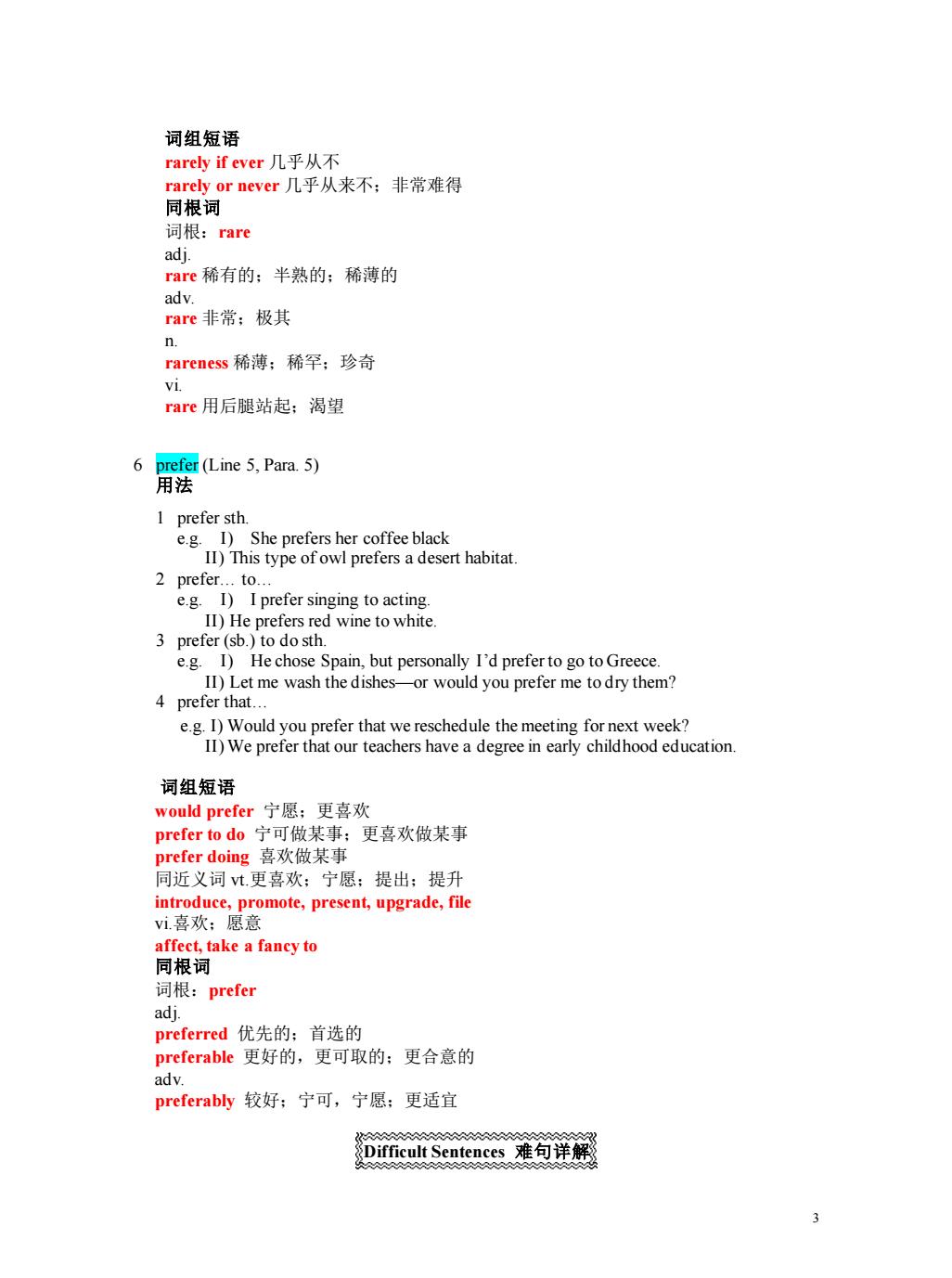
词组短语 rarely if ever几乎从不 rarely or never几乎从来不;非常难得 同根词 词根:rare adi. rare稀有的;半熟的;稀薄的 adv. rare非常;极其 n. rareness稀薄;稀罕;珍奇 Vi. rare用后腿站起;渴望 6 prefer (Line 5,Para.5) 用法 1 prefer sth e.g.I)She prefers her coffee black II)This type of owl prefers a desert habitat. 2 prefer...to... e.g.I)I prefer singing to acting. II)He prefers red wine to white. 3 prefer(sb.)to do sth. e.g.I)He chose Spain,but personally I'd prefer to go to Greece. II)Let me wash the dishes-or would you prefer me to dry them? 4 prefer that... e.g.I)Would you prefer that we reschedule the meeting for next week? II)We prefer that our teachers have a degree in early childhood education. 词组短语 would prefer宁愿;更喜欢 prefer to do宁可做某事:更喜欢做某事 prefer doing喜欢做某事 同近义词t更喜欢;宁愿;提出;提升 introduce,promote,present,upgrade,file vi喜欢:愿意 affect,take a fancy to 同根词 词根:prefer adj. preferred优先的;首选的 preferable更好的,更可取的:更合意的 ady. preferably较好;宁可,宁愿;更适宜 AMCAAAMA Difficult Sentences难句详解 3
3 词组短语 rarely if ever 几乎从不 rarely or never 几乎从来不;非常难得 同根词 词根:rare adj. rare 稀有的;半熟的;稀薄的 adv. rare 非常;极其 n. rareness 稀薄;稀罕;珍奇 vi. rare 用后腿站起;渴望 6 prefer (Line 5, Para. 5) 用法 1 prefer sth. e.g. I) She prefers her coffee black II) This type of owl prefers a desert habitat. 2 prefer… to… e.g. I) I prefer singing to acting. II) He prefers red wine to white. 3 prefer (sb.) to do sth. e.g. I) He chose Spain, but personally I’d prefer to go to Greece. II) Let me wash the dishes—or would you prefer me to dry them? 4 prefer that… e.g. I) Would you prefer that we reschedule the meeting for next week? II) We prefer that our teachers have a degree in early childhood education. 词组短语 would prefer 宁愿;更喜欢 prefer to do 宁可做某事;更喜欢做某事 prefer doing 喜欢做某事 同近义词 vt.更喜欢;宁愿;提出;提升 introduce, promote, present, upgrade, file vi.喜欢;愿意 affect, take a fancy to 同根词 词根:prefer adj. preferred 优先的;首选的 preferable 更好的,更可取的;更合意的 adv. preferably 较好;宁可,宁愿;更适宜 Difficult Sentences 难句详解
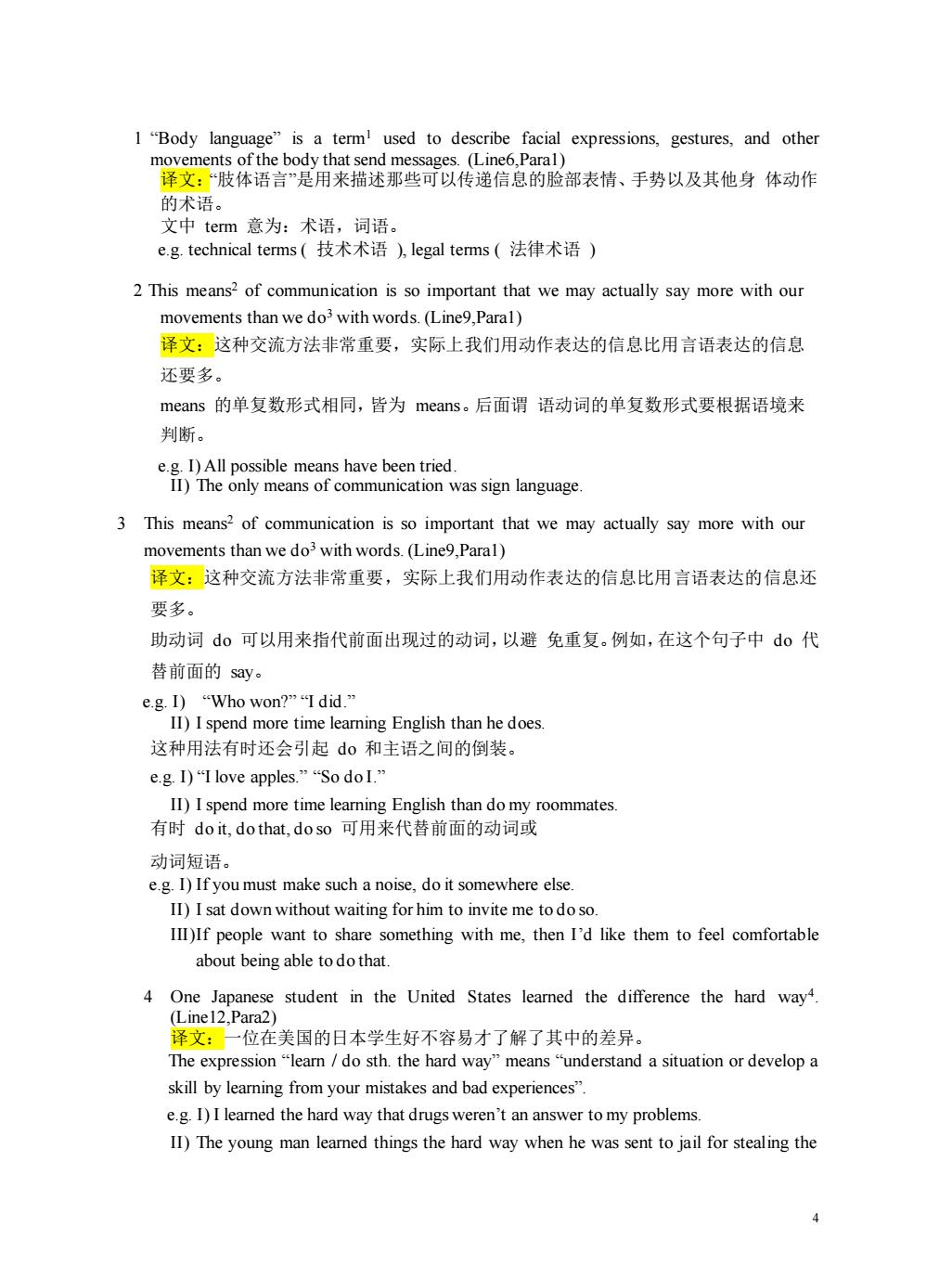
1 "Body language"is a term!used to describe facial expressions,gestures,and other movements of the body that send messages.(Line6,Paral) 译文:“肢体语言”是用来描述那些可以传递信息的脸部表情、手势以及其他身体动作 的术语。 文中tem意为:术语,词语。 e.g.technical terms(技术术语),legal terms(法律术语) 2 This means2 of communication is so important that we may actually say more with our movements than we do3 with words.(Line9,Paral) 译文:这种交流方法非常重要,实际上我们用动作表达的信息比用言语表达的信息 还要多。 means的单复数形式相同,皆为means。后面谓语动词的单复数形式要根据语境来 判断。 e.g.I)All possible means have been tried. II)The only means of communication was sign language 3 This means2 of communication is so important that we may actually say more with our movements than we do3 with words.(Line9,Paral) 译文:这种交流方法非常重要,实际上我们用动作表达的信息比用言语表达的信息还 要多。 助动词d0可以用来指代前面出现过的动词,以避免重复。例如,在这个句子中d0代 替前面的say。 e.g.I)“Who won?”Idid.” II)I spend more time learning English than he does. 这种用法有时还会引起do和主语之间的倒装。 e.g.I)I love apples.”“So doI.” II)I spend more time learning English than do my roommates 有时doit,do that,doso可用来代替前面的动词或 动词短语。 e.g.I)If you must make such a noise,do it somewhere else. II)I sat down without waiting for him to invite me to do so. III)If people want to share something with me,then I'd like them to feel comfortable about being able to do that. 4 One Japanese student in the United States learned the difference the hard way4. (Line12.Para2) 译文:一位在美国的日本学生好不容易才了解了其中的差异。 The expression"learn /do sth.the hard way"means "understand a situation or develop a skill by learning from your mistakes and bad experiences". e.g.I)I learned the hard way that drugs weren't an answer to my problems. II)The young man learned things the hard way when he was sent to jail for stealing the 4
4 1 “Body language” is a term1 used to describe facial expressions, gestures, and other movements of the body that send messages. (Line6,Para1) 译文:“肢体语言”是用来描述那些可以传递信息的脸部表情、手势以及其他身 体动作 的术语。 文中 term 意为:术语,词语。 e.g. technical terms ( 技术术语 ), legal terms ( 法律术语 ) 2 This means2 of communication is so important that we may actually say more with our movements than we do3 with words. (Line9,Para1) 译文:这种交流方法非常重要,实际上我们用动作表达的信息比用言语表达的信息 还要多。 means 的单复数形式相同,皆为 means。后面谓 语动词的单复数形式要根据语境来 判断。 e.g. I) All possible means have been tried. II) The only means of communication was sign language. 3 This means2 of communication is so important that we may actually say more with our movements than we do3 with words. (Line9,Para1) 译文:这种交流方法非常重要,实际上我们用动作表达的信息比用言语表达的信息还 要多。 助动词 do 可以用来指代前面出现过的动词,以避 免重复。例如,在这个句子中 do 代 替前面的 say。 e.g. I) “Who won?” “I did.” II) I spend more time learning English than he does. 这种用法有时还会引起 do 和主语之间的倒装。 e.g. I) “I love apples.” “So do I.” II) I spend more time learning English than do my roommates. 有时 do it, do that, do so 可用来代替前面的动词或 动词短语。 e.g. I) If you must make such a noise, do it somewhere else. II) I sat down without waiting for him to invite me to do so. III)If people want to share something with me, then I’d like them to feel comfortable about being able to do that. 4 One Japanese student in the United States learned the difference the hard way4 . (Line12,Para2) 译文:一位在美国的日本学生好不容易才了解了其中的差异。 The expression “learn / do sth. the hard way” means “understand a situation or develop a skill by learning from your mistakes and bad experiences”. e.g. I) I learned the hard way that drugs weren’t an answer to my problems. II) The young man learned things the hard way when he was sent to jail for stealing the
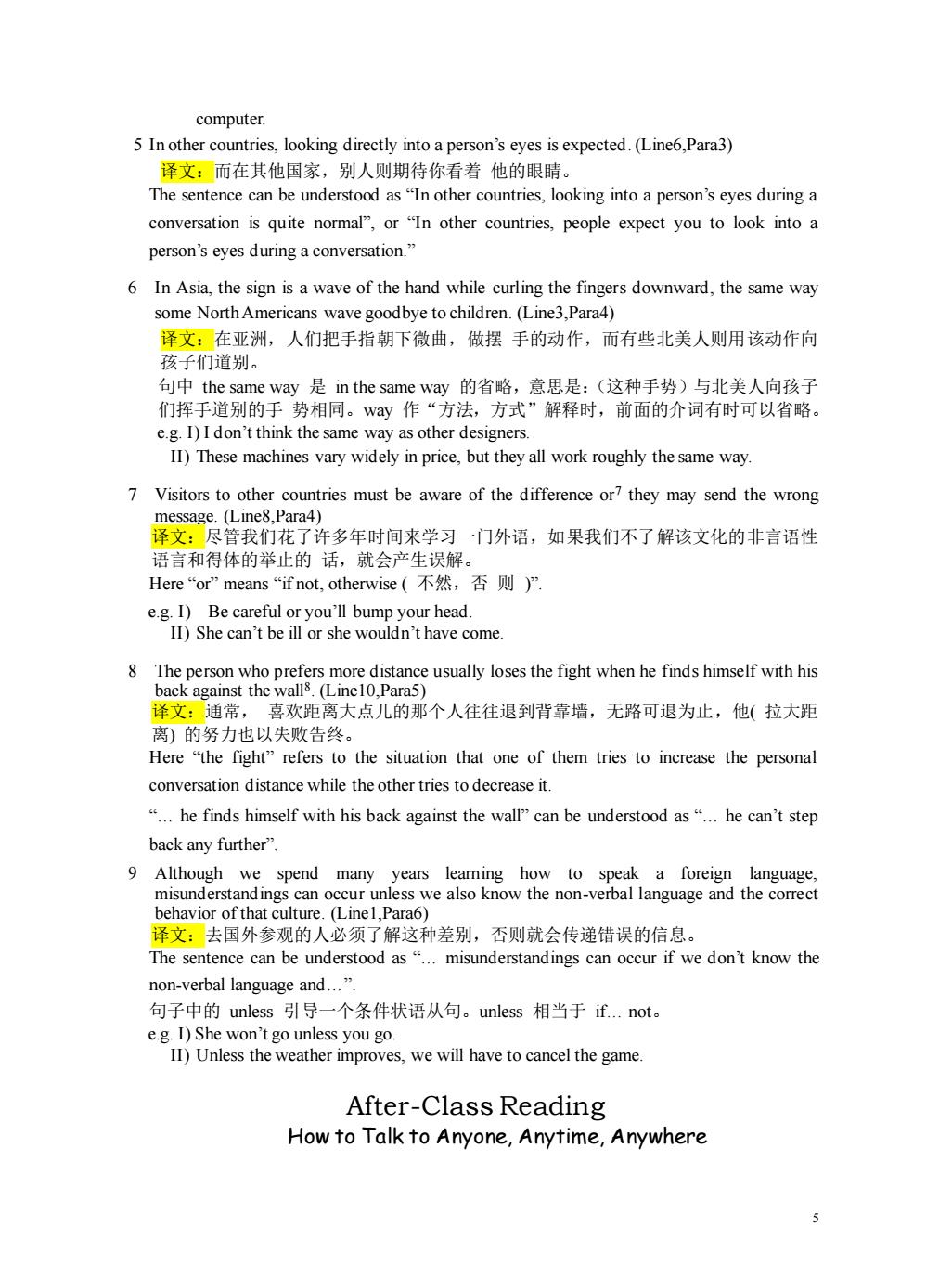
computer 5 In other countries,looking directly into a person's eyes is expected.(Line6,Para3) 译文:而在其他国家,别人则期待你看着他的眼睛。 The sentence can be understood as"In other countries,looking into a person's eyes during a conversation is quite normal",or "In other countries,people expect you to look into a person's eyes during a conversation." 6 In Asia,the sign is a wave of the hand while curling the fingers downward,the same way some North Americans wave goodbye to children.(Line3,Para4) 译文:在亚洲,人们把手指朝下微曲,做摆手的动作,而有些北美人则用该动作向 孩子们道别。 句中the same way是in the same way的省略,意思是:(这种手势)与北美人向孩子 们挥手道别的手势相同。wy作“方法,方式”解释时,前面的介词有时可以省略。 e.g.I)I don't think the same way as other designers II)These machines vary widely in price,but they all work roughly the same way. 7 Visitors to other countries must be aware of the difference or?they may send the wrong message.(Line8,Para4) 译文:尽管我们花了许多年时间来学习一门外语,如果我们不了解该文化的非言语性 语言和得体的举止的话,就会产生误解。 Here"or”means“if not,otherwise(不然,否则)” e.g.I)Be careful or you'll bump your head. II)She can't be ill or she wouldn't have come 8 The person who prefers more distance usually loses the fight when he finds himself with his back against the wall8.(Line10,Para5) 译文:通常,喜欢距离大点儿的那个人往往退到背靠墙,无路可退为止,他(拉大距 离)的努力也以失败告终。 Here "the fight"refers to the situation that one of them tries to increase the personal conversation distance while the other tries to decrease it. "..he finds himself with his back against the wall"can be understood as"...he can't step back any further'” 9 Although we spend many years learning how to speak a foreign language, misunderstand ings can occur unless we also know the non-verbal language and the correct behavior of that culture.(Linel,Para6) 译文:去国外参观的人必须了解这种差别,否则就会传递错误的信息。 The sentence can be understood as "..misunderstandings can occur if we don't know the non-verbal language and...". 句子中的unless引导一个条件状语从句。unless相当于if.not。 e.g.I)She won't go unless you go. II)Unless the weather improves,we will have to cancel the game. After-Class Reading How to Talk to Anyone,Anytime,Anywhere 5
5 computer. 5 In other countries, looking directly into a person’s eyes is expected. (Line6,Para3) 译文:而在其他国家,别人则期待你看着 他的眼睛。 The sentence can be understood as “In other countries, looking into a person’s eyes during a conversation is quite normal”, or “In other countries, people expect you to look into a person’s eyes during a conversation.” 6 In Asia, the sign is a wave of the hand while curling the fingers downward, the same way some North Americans wave goodbye to children. (Line3,Para4) 译文:在亚洲,人们把手指朝下微曲,做摆 手的动作,而有些北美人则用该动作向 孩子们道别。 句中 the same way 是 in the same way 的省略,意思是:(这种手势)与北美人向孩子 们挥手道别的手 势相同。way 作“方法,方式”解释时,前面的介词有时可以省略。 e.g. I) I don’t think the same way as other designers. II) These machines vary widely in price, but they all work roughly the same way. 7 Visitors to other countries must be aware of the difference or7 they may send the wrong message. (Line8,Para4) 译文:尽管我们花了许多年时间来学习一门外语,如果我们不了解该文化的非言语性 语言和得体的举止的 话,就会产生误解。 Here “or” means “if not, otherwise ( 不然,否 则 )”. e.g. I) Be careful or you’ll bump your head. II) She can’t be ill or she wouldn’t have come. 8 The person who prefers more distance usually loses the fight when he finds himself with his back against the wall8 . (Line10,Para5) 译文:通常, 喜欢距离大点儿的那个人往往退到背靠墙,无路可退为止,他( 拉大距 离) 的努力也以失败告终。 Here “the fight” refers to the situation that one of them tries to increase the personal conversation distance while the other tries to decrease it. “… he finds himself with his back against the wall” can be understood as “… he can’t step back any further”. 9 Although we spend many years learning how to speak a foreign language, misunderstandings can occur unless we also know the non-verbal language and the correct behavior of that culture. (Line1,Para6) 译文:去国外参观的人必须了解这种差别,否则就会传递错误的信息。 The sentence can be understood as “… misunderstandings can occur if we don’t know the non-verbal language and…”. 句子中的 unless 引导一个条件状语从句。unless 相当于 if… not。 e.g. I) She won’t go unless you go. II) Unless the weather improves, we will have to cancel the game. After-Class Reading How to Talk to Anyone, Anytime, Anywhere